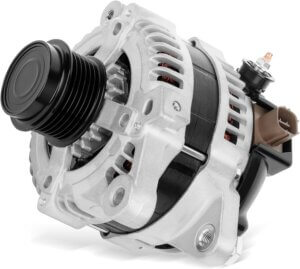Yes, a car can start with a bad alternator, but it may not run for long. The alternator’s role is to charge the car’s battery while the engine is running and to power the vehicle’s electrical systems. If the alternator is failing, it may not adequately charge the battery, leading to a situation where the battery’s stored power is used to start the car but may quickly deplete if the alternator isn’t providing the necessary charge.
If the battery has enough charge to start the engine, the car will start, but because the alternator is not functioning correctly, the battery will not recharge as the vehicle runs. This can result in the battery’s charge being drained quickly, especially if electrical accessories are being used, and the car may stall or be unable to restart once turned off.
In some cases, you can jumpstart a car with a bad alternator to get the engine running, but it’s advised to drive immediately to a mechanic because the car may only run for a short period before the battery is completely drained. It’s also recommended to turn off any non-essential electrical accessories to conserve battery power.

If you’re experiencing issues with starting your car and suspect it might be the alternator, it’s important to have it checked by a professional. They can diagnose whether the problem is with the alternator, the battery, or another part of the electrical system.
Signs of a Bad Alternator
Symptoms of a bad alternator include:
- Dim or overly bright lights
- Slow or malfunctioning accessories
- Battery warning light on the dashboard
- Trouble starting or frequent stalling
- Growling or whining noises
- Burning rubber or wire smell
- Vibrations due to misfires caused by lack of current
Recognizing these signs early is crucial for timely repair and to avoid the safety risks associated with driving with a bad alternator.
What To Do If Your Car Won’t Start
If your car won’t start and you suspect a bad alternator, jumpstarting might help you get to a mechanic, but it’s not a long-term solution. The best course of action is to seek professional help for a proper diagnosis and repair. To maintain alternator health, follow your vehicle’s maintenance schedule and address any issues promptly.
What Causes a Bad Alternator
Several factors can cause an alternator to go bad, including:
- Age and wear: Over time, the alternator may fail due to age and use-related wear.
- Fluid leaks: Engine oil or power steering fluid leaking onto the alternator can lead to its failure.
- Prolonged idling with multiple electrical accessories: This can prematurely wear the alternator.
- Salt and water intrusion: If the alternator is located near the engine’s bottom, salt and water intrusion can result in a malfunctioning alternator.
- Heat, vibration, and electrical spikes: These factors can also contribute to the wear and tear of the alternator.
It’s important to address these issues promptly to prevent further damage to the vehicle’s electrical system.
Tips to Prevent an Alternator from Failing
To prevent alternator failure, you can take the following measures:
- Carry out regular maintenance: Regularly servicing the alternator and checking its components can help identify and address issues before they become severe.
- Manage your car battery correctly: Properly maintaining and charging the car battery can reduce the strain on the alternator.
- Avoid excessive electrical accessories: Limiting the use of electrical accessories, especially during prolonged idling, can help prevent premature wear on the alternator.
- Watch for red flags: Be attentive to warning signs of alternator problems, such as dimming lights or unusual sounds, and address them promptly.
- Properly install any aftermarket electronics: If you add new electronic components to your vehicle, ensure they are installed correctly to avoid overloading the alternator.
- Watch for fluid leaks: Regularly inspect your vehicle for fluid leaks, as oil or power steering fluid leaking onto the alternator can lead to its failure

